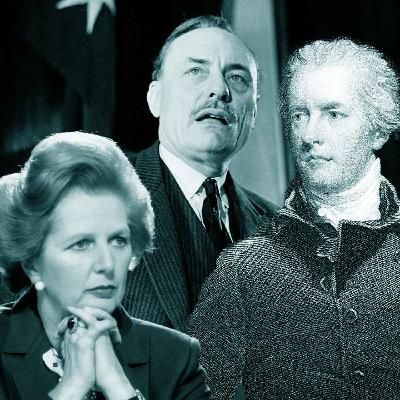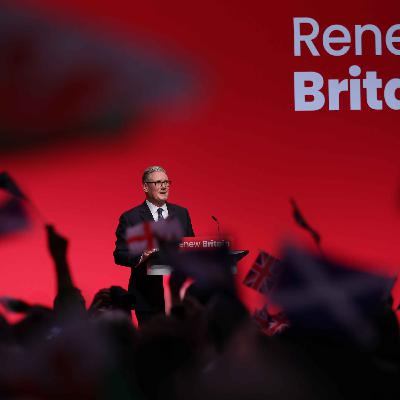Discover Coffee House Shots
Coffee House Shots

Coffee House Shots
Author: The Spectator
Subscribed: 6,252Played: 1,362,692Subscribe
Share
© 343517
Description
Daily political analysis from The Spectator's top team of writers, including Michael Gove, Tim Shipman, Isabel Hardman, James Heale, Lucy Dunn and many others.
Hosted on Acast. See acast.com/privacy for more information.
3069 Episodes
Reverse
Keir Starmer did not go into Prime Minister’s Questions with the intention of resolving the row over the collapse of the Chinese spying case: he merely wanted to avoid the pressure building too much. He announced in a long statement at the start of the session that the government would be publishing its three witness statements, and then spent the rest of his sparring with Kemi Badenoch arguing that this was all the fault of the previous government anyway. So who is to blame, the Tories or Labour? What does the inability to deal with this scandal say about the ineptitude of successive governments, and how they communicate with the public?James Heale speaks to Tim Shipman and Isabel Hardman.Produced by Oscar EdmondsonBecome a Spectator subscriber today to access this podcast without adverts. Go to spectator.co.uk/adfree to find out more.For more Spectator podcasts, go to spectator.co.uk/podcasts.Contact us: podcast@spectator.co.uk
Hosted on Acast. See acast.com/privacy for more information.
Tim Shipman and Charles Parton, China adviser at the Council on Geostrategy, join James Heale to discuss the ongoing fallout over the collapse of the Westminster spy case. Security minister Dan Jarvis answered an urgent question on the matter late on Monday in Parliament, stringently denying that the government played an active role in collapsing the case. But, as Charles and Tim stress, the case still doesn't add up. Is it as simple as the government not wanting to offend China? And is the deputy national security adviser being 'hung out to dry'?Produced by Patrick Gibbons.Become a Spectator subscriber today to access this podcast without adverts. Go to spectator.co.uk/adfree to find out more.For more Spectator podcasts, go to spectator.co.uk/podcasts.Contact us: podcast@spectator.co.uk
Hosted on Acast. See acast.com/privacy for more information.
It’s a ‘great and beautiful day’, as Donald Trump wrote in the guestbook at the Knesset, where he will address the Israeli parliament after the final hostages were handed back to Israel. It is, of course, a historic piece of diplomacy, and the conversation in Westminster has turned to the extent to which the UK was involved. Bridget Phillipson claimed over the weekend that Britain played a ‘key role’ in bringing about peace – much to the chagrin of Mike Huckabee, the US Ambassador to Israel, who called her ‘delusional’. Is she?The government have more pressing issues, however, with the collapsed China spy case – the sudden abandonment of a case brought against two men (Chris Cash, a parliamentary researcher, and Chris Berry, an academic). National Security Adviser Jonathan Powell appears to be central to this decision, but the current government line is that Powell had no role in the ‘substance or the evidence’ of the case – a formulation which smacks of legalese. Will he be the next to go?Oscar Edmondson speaks to Tim Shipman and James Heale.Produced by Oscar Edmondson.Become a Spectator subscriber today to access this podcast without adverts. Go to spectator.co.uk/adfree to find out more.For more Spectator podcasts, go to spectator.co.uk/podcasts.Contact us: podcast@spectator.co.uk
Hosted on Acast. See acast.com/privacy for more information.
Isabel Hardman presents highlights from Sunday morning's political shows.A ceasefire begins in the Middle East, as world leaders prepare for Monday's peace summit. And questions linger over the collapsed Chinese spy trial.Produced by Joe Bedell-Brill.Become a Spectator subscriber today to access this podcast without adverts. Go to spectator.co.uk/adfree to find out more.For more Spectator podcasts, go to spectator.co.uk/podcasts.Contact us: podcast@spectator.co.uk
Hosted on Acast. See acast.com/privacy for more information.
From wartime leadership to economic revolutions, Conservative figures have shaped Britain’s past and present. But who stands out as the greatest of them all? In this conversation, recorded live at Conservative Party Conference: Katie Lam makes the case for William Pitt the Younger, Camilla Tominay nominates Margaret Thatcher, William Atkinson points out the number of young Tories who now idolise Enoch Powell, and Neil O’Brien explains why all conservatives should know about Jerzy Popieluszko. Who wins? You decide.Become a Spectator subscriber today to access this podcast without adverts. Go to spectator.co.uk/adfree to find out more.For more Spectator podcasts, go to spectator.co.uk/podcasts.Contact us: podcast@spectator.co.uk
Hosted on Acast. See acast.com/privacy for more information.
Recorded live in Manchester, during the Conservative Party conference, Michael Gove sits down with Tim Shipman, Madeline Grant and Tim Montgomerie to discuss how the Tories can turn their fortunes around. Do the Tories need to show contrition for their record in government? Has the party basically been split ever since the Coalition years? And does Nigel Farage need to set a deadline for Tory to Reform defectors? Plus – from Canada to Italy – which countries do British Conservatives need to look towards for inspiration?Produced by Patrick Gibbons.Become a Spectator subscriber today to access this podcast without adverts. Go to spectator.co.uk/adfree to find out more.For more Spectator podcasts, go to spectator.co.uk/podcasts.Contact us: podcast@spectator.co.uk
Hosted on Acast. See acast.com/privacy for more information.
Donald Trump says Israel and Hamas have agreed to the first phase of his Gaza peace plan. During an extraordinary round table on the Antifa organisation last night, the US President was interrupted by Marco Rubio and given a hand-written message. He told those assembled at the White House: ‘I was just given a note by the Secretary of State saying that we’re very close to a deal in the Middle East, and they’ll need me pretty quickly.’ Details of the deal, including the finalised list of prisoners Hamas wants freed as part of an exchange, remain unclear. But the first part of the deal could be set in motion as soon as today once the Israeli government approves the plan at around 2 p.m. local time. Is he heading for a Nobel Peace Prize?Meanwhile, Starmer is in Mumbai, researching India’s digital ID system as a potential model for the UK. The Prime Minister said India’s scheme, which has been rolled out to almost all 1.4 billion citizens over the past 15 years, had been a ‘massive success’. Lucy Dunn speaks to Tim Shipman and Michael Stephens, senior fellow at RUSI.Produced by Oscar Edmondson.Become a Spectator subscriber today to access this podcast without adverts. Go to spectator.co.uk/adfree to find out more.For more Spectator podcasts, go to spectator.co.uk/podcasts.Contact us: podcast@spectator.co.uk
Hosted on Acast. See acast.com/privacy for more information.
This morning Kemi Badenoch wrapped up Tory conference with a speech that will – for now at least – calm Tory jitters. The Tory leader’s hour-long address in Manchester was intended as a rejoinder to critics of her leadership and she certainly achieved that aim. Having been accused of lacking spirit, imagination and vigour, Badenoch today demonstrated all three and gave an idea of what the direction of the party looks like under her. The main headline grabbing announcement was her plan to abolish stamp duty – a surprise ‘rabbit’ that sparked a standing ovation. Is she safe, for now?Lucy Dunn speaks to James Heale and William Atkinson.Become a Spectator subscriber today to access this podcast without adverts. Go to spectator.co.uk/adfree to find out more.For more Spectator podcasts, go to spectator.co.uk/podcasts.Contact us: podcast@spectator.co.uk
Hosted on Acast. See acast.com/privacy for more information.
Tim Shipman, James Heale and Lucy Dunn record live at Conservative party conference in Manchester. What's the mood at conference – and has Kemi done enough to neutralise her detractors? Tim says he expects there to be no immediate leadership challenge but the Conservatives need to get real about the 'attention economy' they're faced with. What inspiration can they take from Tory grandee Michael Heseltine? And can they 'make conservative sexy again'? Plus, audience questions on the upcoming budget and the challenges for the Conservatives in both Wales and Scotland.Produced by Patrick Gibbons.Become a Spectator subscriber today to access this podcast without adverts. Go to spectator.co.uk/adfree to find out more.For more Spectator podcasts, go to spectator.co.uk/podcasts.Contact us: podcast@spectator.co.uk
Hosted on Acast. See acast.com/privacy for more information.
Tim Shipman and Michael Simmons join Lucy Dunn live at Manchester for Conservative party conference. It's day two, and we've heard from shadow chancellor Mel Stride, who unveiled various pledges including business rates relief and spending cuts. The Tories are clearly trying to position themselves again as the party of 'fiscal prudence' – but are people listening to them? As the team points out – whether through a lack of protestors or the speedy serving times at the conference bar – the convention centre is pretty quiet. Produced by Patrick Gibbons.Become a Spectator subscriber today to access this podcast without adverts. Go to spectator.co.uk/adfree to find out more.For more Spectator podcasts, go to spectator.co.uk/podcasts.Contact us: podcast@spectator.co.uk
Hosted on Acast. See acast.com/privacy for more information.
Isabel Hardman presents highlights from Sunday morning's political shows.Kemi Badenoch launches the Conservative Party Conference, the home secretary promises tougher protest laws in the wake of the Manchester terror attack, and Lucy Powell stakes her claim to be deputy leader of the Labour Party.Produced by Joe Bedell-Brill.Become a Spectator subscriber today to access this podcast without adverts. Go to spectator.co.uk/adfree to find out more.For more Spectator podcasts, go to spectator.co.uk/podcasts.Contact us: podcast@spectator.co.uk
Hosted on Acast. See acast.com/privacy for more information.
The general election result of 2024 reflected – among other things – a collapse of trust among British voters in the Conservatives. How can the British right evolve so it learns lessons from the past and from across the pond, in order to win back its base?This is an excerpt from an event hosted by The Spectator and American Compass; a leading US think tank. The panel includes:Robert Jenrick MP, Shadow Secretary of State for Justice and MP for NewarkMiriam Cates, former MP for Penistone and Stocksbridge and GB News PresenterGavin Rice, head of political economy at OnwardNick Timothy, MP for West SuffolkHenry Olsen, Senior Fellow, Ethics & Public Policy CentreProduced by Oscar Edmondson and Patrick Gibbons.Become a Spectator subscriber today to access this podcast without adverts. Go to spectator.co.uk/adfree to find out more.For more Spectator podcasts, go to spectator.co.uk/podcasts.Contact us: podcast@spectator.co.uk
Hosted on Acast. See acast.com/privacy for more information.
On today’s Coffee House Shots, Tim Shipman is joined by Michael Gove to reflect on the terrorist attack at Heaton Park Synagogue in Manchester, which left two people dead. They discuss how the Jewish community has long warned of rising anti-Semitism, often forced to fund its own security, and how inflammatory rhetoric on recent pro-Palestinian marches has deepened the sense of vulnerability.Michael warns that Britain remains naive about Islamist ideology and risks only ever reacting to violence, rather than preventing it. While there are capable people in government and the security services, he says, real leadership is needed to confront the ideology that fuels attacks before more tragedies occur. Does the Prevent system need reform? And could tragedies such as this be avoided by a more restrictive border policy?Produced by Oscar Edmondson and Megan McElroy.Become a Spectator subscriber today to access this podcast without adverts. Go to spectator.co.uk/adfree to find out more.For more Spectator podcasts, go to spectator.co.uk/podcasts.Contact us: podcast@spectator.co.uk
Hosted on Acast. See acast.com/privacy for more information.
The Prime Minister was set to announce his crackdown on the existing rights of refugees at the European Political Community meeting today; however, he has flown back to chair a Cobra meeting after a terror attack in Manchester. Two people have been killed and at least two others injured after a driver allegedly rammed a car into pedestrians outside a synagogue and attacked them with a knife. The suspect, who was shot by police, is also believed to be dead.Also on the podcast, Tim Shipman interviews Kemi Badenoch for the magazine this week. As she enters conference season with the Tories running third in the polls behind Reform and Labour, she tells Tim that she is up for a fight. On Friday, her shadow cabinet will agree a policy of leaving the European Convention on Human Rights (ECHR) but her first conference announcement – revealed exclusively to Tim – will be scrapping the Climate Change Act. Will she resign if the Conservatives go backwards in next year’s elections? ‘Ask me that after the locals,’ she says. Will this be her last Tory conference as leader? Lucy Dunn speaks to Tim Shipman and James Heale.Produced by Oscar Edmondson.Become a Spectator subscriber today to access this podcast without adverts. Go to spectator.co.uk/adfree to find out more.For more Spectator podcasts, go to spectator.co.uk/podcasts.Contact us: podcast@spectator.co.uk
Hosted on Acast. See acast.com/privacy for more information.
Tim Shipman and Claire Ainsley from the Progressive Policy Institute join Patrick Gibbons to reflect on Labour's party conference as it draws to a close in Liverpool. This conference has been received positively for Labour but, on the final day, a hustings for the deputy leadership demonstrated that divides remain under the surface. Is Lucy Powell versus Bridget Phillipson a case of left versus right in the party, or is it more about the outsider versus the insider? And, as a leading political commentator declares Labour to now be the 'party of the professional middle class', what does the contest tell us about who Labour needs to appeal to? Produced by Patrick Gibbons.Become a Spectator subscriber today to access this podcast without adverts. Go to spectator.co.uk/adfree to find out more.For more Spectator podcasts, go to spectator.co.uk/podcasts.Contact us: podcast@spectator.co.uk
Hosted on Acast. See acast.com/privacy for more information.
We have just heard the Prime Minister’s headline speech at Labour Party Conference and – whisper it quietly – that might have been Keir Starmer’s best yet. As briefed out beforehand it was a patriotic address, with lots of flag waving in the room as he presented his version of patriotism in contrast to a Nigel Farage who is guilty of talking Britain down.It was miles better than the dreariness of last year and instead struck a chord of hope against the broken Britain narrative. Even though there was little of actual substance on the economy and more platitudes about ‘smashing the gangs’, this did seem like a landmark moment for Keir Starmer where he communicated an actual plan for the Britain he wants to build. He also managed to trumpet some of Labour’s successes, mimicking Gordon Brown as he listed off their first year wins. At times this Labour party has felt like an ocean liner, but is he finally turning things around and bringing the fight to Reform? Is this ‘Starmerism’?Oscar Edmondson speaks to Tim Shipman and James Heale.Produced by Oscar Edmondson.Become a Spectator subscriber today to access this podcast without adverts. Go to spectator.co.uk/adfree to find out more.For more Spectator podcasts, go to spectator.co.uk/podcasts.Contact us: podcast@spectator.co.uk
Hosted on Acast. See acast.com/privacy for more information.
Whilst a certain noisy northern mayor has positioned himself as the problem child of conference 2025, The Spectator finds another Labour politician far more interesting. All around Liverpool the newsstands are decorated by the image of the Home Secretary Shabana Mahmood, dubbed the ‘Terminator’ by Tim Shipman in the most recent issue of The Spectator. As one strategist notes: ‘Shabana is not afraid to use power. That’s what we need.’In this special edition of Coffee House Shots we present a wide-ranging in-conversation between Shabana Mahmood and Spectator editor Michael Gove. Listen for: how to tackle the ‘Boriswave’, whether the Home Office is fit for purpose, Shabana’s compelling case for digital ID cards and her response to Keir Starmer’s claim that Reform are ‘racist’.Produced by Oscar Edmondson and Megan McElroy.Become a Spectator subscriber today to access this podcast without adverts. Go to spectator.co.uk/adfree to find out more.For more Spectator podcasts, go to spectator.co.uk/podcasts.Contact us: podcast@spectator.co.uk
Hosted on Acast. See acast.com/privacy for more information.
Labour party conference has kicked off in Liverpool, and the Chancellor has just delivered her keynote speech.‘Security, security, security’ was the message from Rachel Reeves as she addressed the Labour party faithful. The Labour government, she said, will create an economy that puts the British worker above all else. Aside from setting out her economic vision, she made time for a few jabs in Manchester mayor Andy Burnham’s direction and gave a nod to shadow education secretary Bridget Phillipson (should we take that as an endorsement?). Has she been taking notes from Gordon Brown?Elsewhere, the mood in the bars is much more buoyant than it was last year – although that has a lot to do with the absence of Sue Gray. Starmer’s change of tack and taking the fight to reform on indefinite leave to remain, as well as the announcement of some juicy bits of policy, seems to have placated many. But is conference just a holiday from reality?Lucy Dunn speaks to James Heale and Michael Simmons.Produced by Oscar Edmondson.Become a Spectator subscriber today to access this podcast without adverts. Go to spectator.co.uk/adfree to find out more.For more Spectator podcasts, go to spectator.co.uk/podcasts.Contact us: podcast@spectator.co.uk
Hosted on Acast. See acast.com/privacy for more information.
On the eve of Labour’s party conference, the Spectator's editor Michael Gove sits down with Steve Reed MP, the new Secretary of State for Housing, Communities, and Local Government. The government has announced an historic £5 billion package of funding for 'national renewal' – designed to revive high streets, parks and public spaces. Reed explains how he thinks Labour can win back 'forgotten' communities through building 1.5 million houses through this Parliament, allocating fair funding for councils and devolving more powers to local government. Is this Labour's own 'levelling up' agenda?Become a Spectator subscriber today to access this podcast without adverts. Go to spectator.co.uk/adfree to find out more.For more Spectator podcasts, go to spectator.co.uk/podcasts.Contact us: podcast@spectator.co.uk
Hosted on Acast. See acast.com/privacy for more information.
The Labour machine has whirred into gear to try and contain a certain Northern mayor’s mischievous interventions this week, by announcing a big controversial piece of policy. The news that ID cards – Tony Blair’s pet project – will be introduced has splashed all the front pages, demoting Andy Burnham to yesterday’s news. It’s a policy with broad public support, but with a passionate minority opposition including the leaders of the other major parties. The fact that it is being rebranded as a ‘Brit card’ with the aim of tackling the migration crisis has also ruffled a few feathers. Will it work politically? And, more importantly, will it work in practice? Lucy Dunn speaks to Tim Shipman and James Heale. Produced by Oscar Edmondson. Become a Spectator subscriber today to access this podcast without adverts. Go to spectator.co.uk/adfree to find out more.For more Spectator podcasts, go to spectator.co.uk/podcasts.Contact us: podcast@spectator.co.uk
Hosted on Acast. See acast.com/privacy for more information.

























You're kidding, right!
lib dems are a joke
and not a word about charlie kirk hmmm
It is good that Michael is concerned about antisemitism now. One wonders why the Conservative Party in government, invited so many people from groups known to be extremely hostile to Jews, into the UK.
i think Ash Regan comes across very sensible and articulate. Shame she wants to break up the UK.
Absolutely not. I watched the entire exchange and I can see no evidence of that. President Trump spent the majority of the conversation being wholly cordial and diplomatic. Naturally, individuals who are vehemently anti-Trump, and who focus on the less than diplomatic portions of the exchange, may choose to suggest an ambush of some kind, but I think that would be disingenuous of them. Thanks for another great podcast.
I've decided to stop listening to this. I've heard quite enough of Michael Gove over the past few years, thought he'd disappeared and then he reappeared in this podcast that I used to like. I don't want to hear any more.
This is very incredible. I truly enjoyed it. I am here to share about sonic coffee drinks at https://sonicshappyhour.com/sonic-coffee-menu/
the title of this... starmer leaving in your head rent free
Whoever edited this episode was drunk.
This is a repeat of the previous cast.
Do you need an editor for this podcast? I am available. And I couldn't possibly be any worse than whoever edited this attempt.
Honestly, sort out your volume levels if you want any chance of being taken seriously.
@SpecCoffeeHouse You keep referring to @YouGov poll numbers who till last week were saying Penny is leading the race to be the PM! Stop using these numbers to stop looking like fools @spectator
difference between radio 4 Today and ITV Good morning Britain.. Katy
so no actual conversation/content regarding partygate then? unless i blinked too fast again
I know the answer to this one, and it's not beacuse he stayed on holiday.
We're going to have more hospitalisations, more deaths, more discharged from hospital, and more "cases" that never see a hospital at all. In what proportions? Can we be told that?
Oh how amazingly coincidental that they recently 'accidentally' released a virulent virus which has largely killed off a proportion of the elderly. Couple that with this new incentive to grow the younger population and it's a reasonable strategy for the next 100 years.
Is the Government going to bring in June 20A, June 20B, June 20C etc.